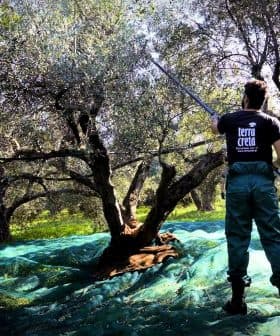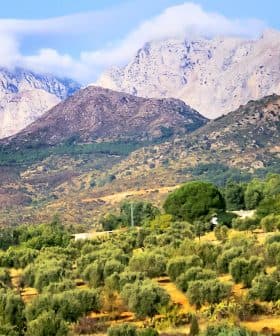Olive Mills Open in Jordan With Average Harvest Predicted
Jordan opened its 132 olive oil mills for the 2020/21 harvesting season, with producers predicting an average season and an estimated production of 23,000 to 24,000 tons of olive oil. The decline in production is attributed to high temperatures and the effects of naturally occurring alternate bearing, with the remaining 20 percent of the annual olive yield reserved for table olives.
Jordan opened up its 132 olive oil mills across the kingdom this week for the start of the 2020/21 harvesting season.
An average season has been predicted by producers and mill owners, with olive oil production estimated at between 23,000 and 24,000 tons.
See Also:Ancient Olive Trees Burn in Jordan WildfiresJordan’s environment minister and acting minister of agriculture, Saleh Kharabsheh, announced the opening of the mills and said that the ministry would ensure mill owners adhered to the kingdom’s environmental and health policies.
Jordan averages an annual olive yield of around 150,000 tons, of which 80 percent is used to produce the kingdom’s usual 22,000 to 24,000 tons of olive oil. The remaining 20 percent is reserved for table olives.
Nidal Samain, spokesman for the kingdom’s olive oil producers and mill owners syndicate confirmed this season’s lower anticipated production levels.
“Olive oil production this year would be sufficient to cover domestic consumption and exports,” he told The Jordan Times. “Currently we only have preliminary estimates, but when the season begins, things will become clearer.”
Samain attributed the decline in this year’s olive harvest to high temperatures and the effects of naturally occurring alternate bearing. (A larger than average crop one year followed by a smaller crop the following year.)
Jordan is home to around 10.5 million olive trees covering 56,000 hectares (138,400 acres) of olive groves which take up around 72 percent of the kingdom’s agricultural land. Most of Jordan’s olive groves are located in the north of the country and provide livelihoods to more than 80,000 Jordanian households.
Earlier this year Olive Oil times reported that much of Jordan’s olive oil from the 2019/20 harvest season remained in storage due to weaker domestic and international demand and Covid-19 containment measures, which prevented the marketing of olive oil.









